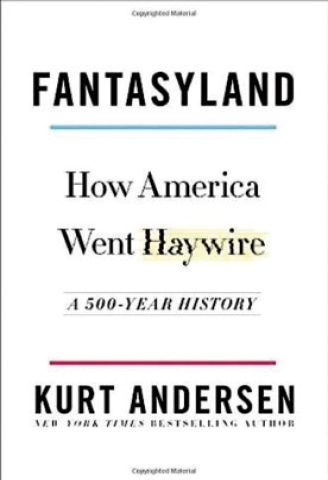Fantasyland: How America Went Haywire — A 500-Year History by Kurt Andersen is a fascinating book that comprehensively explains how the United States of America landed itself with a President Donald Trump. Post-truth. Alternative facts. Bunk. Humbug. Hoaxes, hogwash, post-facts and fake news. For Andersen, these are not recent perversions, but part of American instinct, culture, history and the politics of both the left and the right.
Andersen writes that the American experiment — the original embodiment of the great Enlightenment idea of intellectual freedom, whereby every individual is welcome to believe anything he or she wishes — has metastasised out of control: “Like Alice in Wonderland, we have passed through the looking glass and down the rabbit hole. America has mutated into Fantasyland.”
For example, he says, a third of Americans believe that their government has, in league with the pharmaceutical industry, hidden evidence of natural cancer cures and that extraterrestrials have visited or are visiting Earth. Almost a quarter on the liberal left believe that vaccines cause autism and one third of the right erroneously believe that Trump won the popular vote in 2016. A quarter believes that former president Barack Obama was the anti-Christ. The same quarter of Americans also believe in witches.
US President Donald Trump is both a product of and canny exploiter of the fantasy-industrial complex
Some of these fantasies resemble what many people in illiterate and poor countries may also believe. But what is unusual about America, says Andersen, is that no other advanced, developed and educated country in the world has so many people believing in these outrageous fairy tales.
Before the internet, Andersen writes, crackpots were mostly isolated and surely had a harder time remaining convinced of their alternate realities. Now their devoutly believed opinions are all over the airwaves and the web, just like actual news. Now all of the fantasies look real. American cable channels air documentaries treating mermaids, monsters, ghosts and angels as real. The whole social environment and each of its overlapping parts — cultural, religious, political, intellectual and psychological — have become conducive to spectacular fallacy, “truthiness” and make-believe.
Treating real life as fantasy and vice versa, and taking preposterous ideas seriously, is not unique to Americans. But, says Andersen, America is the global crucible and epicentre that invented the fantasy-industrial complex. This is American exceptionalism in the 21st century.
Andersen’s history of America begins at the beginning, with the Puritans who believed in magical thinking. While Isaac Newton and John Locke were ushering in the Age of Reason in Europe, over in America unreason was taking a new, seductive form. The 1800s saw an explosion of water cures and homeopathy and Franz Anton Mesmer’s hypnoses induced through animal magnetism, called ‘mesmerism’. However, in the 1960s fantasyland went into overdrive — a glaring demonstration was the Esalen Institute in California which had thousands of hippie followers who believed in the supernatural and in madness as a form of superior rationality.
The assassination of former president John F. Kennedy in 1963, followed by the Vietnam War, resulted in conspiracy theories, anti-rationalism and paranoia in the ’70s. In the ’80s, Ronald Reagan’s presidency was famously a triumph of truthiness and entertainment. Presidential politics continued to merge with the fantasy-industrial complex. In 1998, as soon as it was learned that former president Bill Clinton had been fellated by an intern in the West Wing, his popularity spiked.
Rush Limbaugh’s three-hour long, daily right-wing radio show, launched in 1988, brought a sociopolitical alternate reality to a huge national audience. As the radio show took off, in 1992 producer Roger Ailes created a syndicated television show around Limbaugh and put it on a cable channel called Fox News which promoted monstrous lies in support of the political right. False beliefs were rendered both more real-seeming and more contagious, creating a kind of fantasy cascade in which millions of bedoozled Americans surfed and swam.
Thus, the 1990s saw the right become more unhinged than even the counterculture left had been in the ’60s. For example, there was no real left-wing equivalent of Sean Hannity, a host on Fox News who continues ranting nonsense till today. Secondly, only the American right has had a large and organised faction based on paranoid conspiracism for the past six decades, culminating today in Trump adviser Steve Bannon and his delusional notion of a “deep state.”
One reason the right has gone haywire, says Andersen, is religion. The Grand Old Party is now quite explicitly Christian, dominated by Evangelicals. Until about 1980, the Christian right was not a phrase in American politics; today, a two-to-one majority of Republicans say they “support establishing Christianity as the national religion.” Economic insecurity correlates with greater religiosity and, among white Americans, greater religiosity correlates with voting Republican.
Another reason the Republicans became loopy was an overdose of libertarianism, which tends to be pure fiction. What had been the party’s fantastical fringe became its middle. Reasonable Republicanism was replaced by absolutism: no new taxes, virtually no regulation, abolish the Environmental Protection Agency and the Internal Revenue Service and the Federal Reserve. In this environment stepped Trump to con the “poorly educated” and the ready-to-be-suckered part of the nation.
Andersen has been paying close attention to Trump since 1993 and wrote several cover stories in Spy magazine — that he had co-founded in 1986 — “exposing and ridiculing Trump’s lies, brutishness and absurdity.” In his new book, he writes that Trump is a grifter driven by resentment of the establishment. Trump is, first and last, a creature of the fantasy-industrial complex. He is P.T. Barnum, the famous conman of the 19th century. He used the new technology and remade pieces of the fantasy-industrial complex as nobody had ever used them before and Twitter became his unmediated personal channel for entertaining outrage and untruth.

Trump launched his political career by embracing a brand new conspiracy theory twisted around two American taproots: fear and loathing of foreigners and of non-whites. He singled out Mexicans and Muslims as his biggest targets. In 2011, he became the chief promoter of the fantasy that Obama was born in Kenya. And it has all worked for him because so many Americans are eager to believe almost any conspiracy theory, no matter how implausible; the result was that nearly 63 million Americans voted for him in the 2016 elections.
And that is the crux of Andersen’s brilliant book on how Trump became president of the US. As Demosthenes, the ancient Greek orator and politician said, the easiest thing is to deceive oneself, for we believe whatever we want to believe.
Andersen concludes his book with a depressing truth: “I really can imagine, for the first time in my life, that America has permanently tipped into irreversible decline, heading deeper into Fantasyland. I wonder whether it’s only America’s destiny, exceptional as ever, to unravel in this way.” What should be done now? For a start, it is time, writes Andersen, that Americans heed the long-standing advice of former senator Daniel Patrick Moynihan, who said that while one was entitled to one’s own opinion, one was not entitled to one’s own facts.
The reviewer is a retired diplomat and former editor of The Pakistan Review
Fantasyland: How America
Went Haywire — A
500-Year History
By Kurt Andersen
Random House, US
ISBN: 978-1400067213
462pp.
Published in Dawn, EOS, January 7th, 2017

































